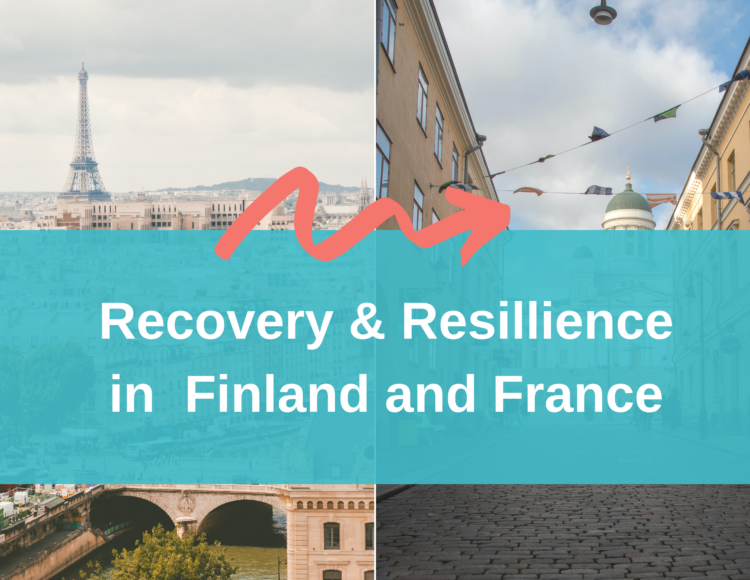As a follow up to our Comparative analysis of last November on the Impact of the Recovery Plans on the social and affordable housing sector, 2 new country profiles are published each month. Now it is the turn of Finland and France. Let’s see the highlights of these Plans below.
Finland
Finland’s Recovery and Resilience Plan is centred around four priorities: Green transition, Digitalisation, Employment and skills and Health & social services.
Affordable housing investments could be supported under the Green transition priority which represents a total of €695 million budget at current prices.
The Sustainable Growth Programme will bring forward solutions that can reduce emissions both in Finland and worldwide. Finland aims to achieve carbon neutrality by 2035 and to halt the decline in biodiversity by 2030. Renewable energy sources account for more than 40% of final energy consumption in Finland. By 2030, the national energy and climate strategy aims to increase the use of renewable energy so that its share of final energy consumption is more than 50 %.
‘Green transition’ projects focus on areas such as:
- accelerating the uptake of environmental solutions and the switch from oil heating in the real estate and construction sector
- Energy efficiency, renovation and self-production of buildings, Low-carbon solutions for communities and transport
- nature-based solutions, such as gypsum treatment of arable land to reduce the nutrient load in the Baltic Sea.
The relevant reform of the Plan is the Land Use and Building Act. This reform will provide guidance for low-carbon construction and to make comprehensive provision for the digitalisation of information and interoperability throughout the construction life cycle.
Relevant investments include among others the Support the replacement of building heating systems from fossil oil to low-carbon energy efficient heating (€70 million) and the Low-carbon built environment programme (€40 million).
France
The French Plan, called France relance amounts to a total of € 93,4 billion which equals to 4.1% of the domestic GDP.
€ 40 billion grants from the RRF will be committed of which € 500 million is planned to be spent for the renovation of the social housing stock.
Under Social and territorial cohesion, Component 1 contributes to improving social cohesion by reducing energy poverty and by supporting investments in the renovation of social housing (€ 0.5 billion).
€ 445 million in 2021 and 2022 will be dedicated for major renovations in order to jump several energy classes and € 50 million for the deployment of industrialized renovation solutions (Energysprong type projects).
Social landlords are encouraged to eliminate energy flaws by 2023. To do so, the Government insists on the need to: ‘ carry out “comprehensive renovations” with the objective of reaching Nearly Zero level; deploying “industrial solutions for energy renovation”: a call for projects will be launched to deploying “industrial solutions for energy renovation of existing social housing”.
In terms of reforms, the recovery and resilience plan puts forward the proposed ‘Climate and Resilience Law’ as a key upcoming reform to underpin the green transition. This proposed law aims contributing to the greenhouse gas emissions reduction target for 2030. According to the impact assessment study, the Law should secure achievement of between half and two-third of the way to be covered between in 2019 and the target for 2030 in terms of greenhouse gas emissions reduction, thanks to a reduction estimated between 56 and 74 million tonnes of CO2 equivalent.
In addition, the revision of the thermal regulation of new buildings (RE2020) will make a significant contribution to the French 2030 target and will enshrine good practices in the domain.
Please download the country profiles for more details.
